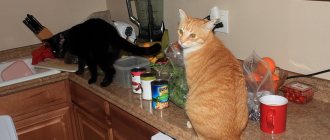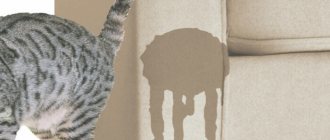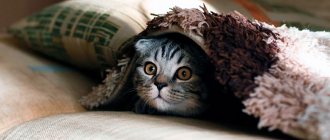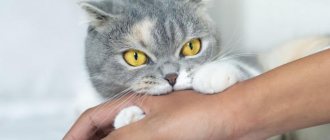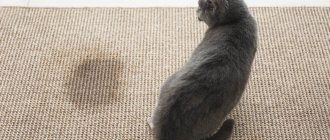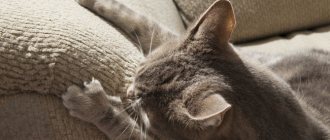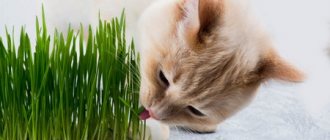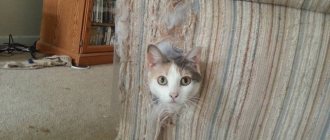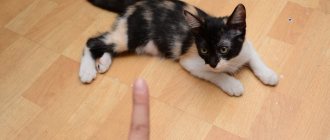Cats have different skills and natural instincts, one of which is their love of digging. Outdoor animals satisfy their need in flower beds, but pets are especially attracted to pots of indoor plants on the window. How to stop a cat from climbing into flower pots is a very pressing question for many owners of domestic cats who are addicted to tearing up green spaces and shitting in pots with soil.
Isolating flowers in the house, hiding access to them for your furry pet, is not an option. A more correct solution to the problem in this case is to raise a cat using small tricks, which we will talk about in our article today!
Why do cats dig in flowers?
There are several reasons why domestic cats climb on pots of soil and chew green spaces in the house. Here's what experts think about this:
- Lack of vitamins and microelements in the animal’s body. Street cats look for medicinal grass and eat it, which allows the body to obtain the necessary substances. Domestic cats can eat plants in flower pots, which is very unsafe for the animal itself. For example, some types of house plants are poisonous, and if a cat begins to gnaw on such a stem, there is a high risk of severe poisoning of the animal.
- The cat is looking for a convenient place to go to the toilet. For example, the animal does not like the filler in the tray, but the soil in flower pots is very convenient for this matter. The reason for this cat behavior can also be an uncleaned litter box. Keep the cat litter clean and change the litter in it in a timely manner.
- Cats can climb on window sills and damage green spaces solely because of resentment toward their owner due to lack of attention. With this behavior, the cat not only wants to take revenge, but also to draw attention to itself.
It is not difficult to understand the main reason why a cat climbs into flower pots. If an animal digs the ground and relieves itself there, it means that she is unhappy with her cat litter. The cat eats the stems and leaves of plants - its body lacks vitamins. An animal simply spoils flowers in pots, throws them on the floor, chews leaves or breaks branches - a clear sign of a lack of attention on your part.
Lack of vitamins and microelements
Due to physiological reasons, when there are not enough vitamins, a cat may experience pica. If your cat eats soil from a pot, and you bought it at a flower shop or supermarket and it contains a lot of microelements, then you need to buy your pet multivitamins with microelements. It is important that there are: calcium with potassium, phosphorus, and sodium.
When your pet regularly raids flower pots and eats almost a tablespoon of soil per day, be sure to take your cat to the veterinarian. This may not just be vitamin deficiency, but also some other problems with the body.
Avitaminosis is the most common reason for eating soil against the background of physiological abnormalities. The most striking example from human life is pregnancy, when women have a desire to eat something inedible or combine strange foods with each other.
If your cat greedily eats soil from a flower pot, and you purchased the soil for planting in a specialized store, then in 99% of cases there is a lack of vitamins and microelements in the animal’s body.
READ Angora rabbit - description and varieties of breeds, lifespan
Almost all store-bought plant soils contain bait - potassium, sodium, phosphorus, and sometimes calcium.
In addition to being partial to the soil, the cat will have dull fur or an abnormal appetite - the animal either eats everything without stopping, or completely refuses food.
If you suspect vitamin deficiency in your pet, you need to show it to a veterinarian. A specialist will examine the animal and take a blood test to understand exactly what the cat’s body is missing.
It is important to know! Do not try to cure your pet yourself! The consequences of incorrect dosage of vitamin supplements can be disastrous for the animal!
Methods to combat the problem
The first thing to do in this situation is to raise the cat and, whenever you try to get close to the flower pots, say loudly “No!”
Observing your pet will give you an answer as to why he does this.
Observe, maybe the cat climbs onto the windowsill not in order to spoil your green spaces in the house, but in order to get closer to the window and inspect everything that is happening on the street. In such a situation, the problem can be solved easily and simply! Remove a couple of peas from the windowsill to create an observation deck for your inquisitive kitty.
If your cat digs the ground and shits in it, try changing the type of litter for the litter box. Did not help? Then use a special spray to repel animals. You can buy it at a pet store.
Traditional methods also work effectively:
- Place citrus peels near the plants, pets cannot tolerate this smell;
- cats also don’t like the smell of garlic, place garlic cloves next to flower pots;
- Cover the window sill with food foil, animals do not like to walk on a rustling surface;
- you can use a spray bottle of water to scare away the cat; water treatments will quickly eliminate interest in walking on window sills;
- flower pots can be lubricated on the outside with “Star” balm or essential oils with strong odors;
- Some are helped by ordinary toothpicks, tightly inserted into the ground with flowers with the sharp side like a “hedgehog”; a couple of unpleasant touches will reduce the cat’s interest in home flowers;
- cover the soil in the pots with small pebbles, they will not harm the plants, but will eliminate the cat’s interest in the filler of the flower pots;
- You can put double-sided tape next to the pots; cats don’t particularly like to walk on sticky surfaces.
If your furry friend eats plant leaves and stems, try planting a pet-specific grass in a pot. You can buy such seedlings at a pet store. Green grass is rich in various vitamins and microelements, which will bring undeniable benefits to the body of your tailed pet.
Cat sleeps in a pot
Domestic cats are rarely allowed to go outside and sleeping in a pot is an opportunity for them to feel in harmony with nature. Pets also love to snuggle up to plants and chew leaves. Some people are attracted by the smell of flowers. As an option, cover the flowers with a net or film and fence them with a wooden mini-picket. As soon as the pet falls asleep in the potty, sprinkle water on it.
Action plan for weaning a cat from climbing into a flowerpot:
- Place special crystals on the ground. As the granules swell, they transform into jelly. The crystals do not affect watering and the plant, but they repel animals.
- Cats love the comfort of sleeping on soft ground. Therefore, you can pour pebbles into the pot (preferably sharp ones). This will create discomfort for the pet, and it will look for another place.
- Cover the ground with cardboard. Sprinkle ground pepper on top. The protection is removed only before watering.
- The ground is covered with several layers of foil. The rustling noise will scare away the cat.
- If the flower is small, cover it with a plastic cake lid. Cut a hole at the top to allow air to enter through it. If the plant is tall, the hole is made so that the trunk and leaves pass through it.
- The ground is covered with paper with double-sided tape glued to it. The pet's paws will stick, and he will try not to approach the “dangerous” place anymore.
- A fence is made around the perimeter of the pot from planks or plastic rods tied with thread or glued with tape. The structure is half immersed in the ground.
- You can scatter pieces of garlic, onion, and ginger around the perimeter of the flowerpot.
- Surround the plant with herbs.
- Sprinkle cotton pads with essential oils and place them on the ground.
How to stop a cat from yelling
How to stop a cat from chewing wires
How to easily train a cat to use the toilet in an apartment
Pets like to dig holes and get comfortable in them. This way they can control the surrounding area. A simple method is to make a picket fence from toothpicks or sharp shells and pebbles.
Mental disorders
Pica is a disorder similar in severity to anorexia and bulimia. Expressed in the desire to eat inedible objects. Appears as a result of mental disorder, nervous shock and can lead to death.
Research by scientists on animal behavior has revealed that pets, just like people, are susceptible to depression and fear. Pica in science is divided into two types:
- A common disorder is eating paper, stones, and earth.
- Coprophagia is the eating of feces.
Cats are susceptible to both forms of the disease. In order to determine why a cat eats soil from a psychological point of view, it is necessary to analyze all the facts from the pet’s life.
Why does a cat attack indoor plants?
Pets of all ages experience an irresistible craving for plants, regardless of their gender. If a cat encroaches on your favorite flowers, do not rush to scold her and try to figure out the reason for what is happening.
Desire to eat a flower
Eating leaves and stems of indoor plants indicates a lack of vitamins. Street animals eat grass all the time, so they don’t face this problem. Pets do not have this opportunity, so they often do not receive enough folic acid, calcium, potassium, phosphorus and sodium.
With severe vitamin deficiency, the mustachioed pet begins to eat not only greens, but also the earth. This can lead to diarrhea, vomiting and severe poisoning.
Also, do not forget that any greens are enriched with fiber. This important element is necessary for comfortable digestion and artificial stimulation of vomiting. In addition to trichobezoars (hairballs), the animal can be bothered by worms, gastrointestinal pathologies and infections.
Interested in digging in the ground
Cats love to dig, so they often damage summer cottages during the warm season. Of particular interest are pets with a sedentary lifestyle, often left alone at home. Due to the lack of toys, they have fun as best they can.
The pits that appear are quickly filled with the body of a satisfied mustache. In such a recess he is warm and calm, as he has excellent control of his surroundings. Similar associations are evoked by an ordinary box, which is extremely popular among all representatives of the cat family.
Domestic cats transfer their digging instinct to the soil in which indoor flowers are grown. Many pets are curious to simply dig up the ground - this is a kind of cat leisure.
Perception of a potty as a tray
If your pet relieves itself in a pot, then the problem lies in its upbringing, litter box or illness. This behavior may be explained by:
- rare cleaning of the tray;
- unpleasant odor of the filler;
- young age (the kitten is breastfed and is not yet toilet trained);
- inappropriate location (too noisy and open place) or structure of the tray;
- insufficient number of trays;
- desire to mark territory;
- disease of the genitourinary system or intestines;
- helminthiasis.
When urinating painfully, the animal associates the litter box with unpleasant sensations, so it tries to urinate throughout the house. If you notice this behavior, be sure to contact a veterinary clinic.
Psychological characteristics or problems
Cats may chew leaves to attract their owner's attention or relieve stress. If the pet receives too little attention or has recently experienced a move, then such behavior is completely normal. Try to be close to him to regain his affection and sense of security.
Pay special attention to small children. During games, they often violate the animal's personal space. If a cat's tail is constantly pulled in the toilet or sprayed with water, then he will look for quieter and more reliable places. Rules for handling pets should be laid down from childhood.
Eating soil is not always associated with a lack of nutrients. Sometimes this is explained by pica, a psychological illness that occurs against the background of mental disorder and nervous shock. Eating inedible items can lead to the death of the cat, so this situation should be discussed with a veterinarian.
Most often, animals picked up on the street suffer from pica. In their case, the disorder is explained by long periods of fasting and fear.
Consequences of eating houseplants
As we have already said, many plants in the house are poisonous species, and after consuming them, the animal may be in real danger. What may be the consequences of consuming poisonous plants:
- prolonged diarrhea in a cat;
- nausea, vomiting, loss of appetite;
- severe dehydration of the body;
- general weakness, coma;
- death.
If you do not want to lose your furry friend, protect him from the following plants in the house: dieffenbachia, caladium, azalea, philodendron, schefflera, chrysanthemum, ivy, cyclamen, etc. If your cat has managed to eat the leaves or stems of poisonous plants, immediately take her to an experienced veterinarian.
Cats look for healing herbs and eat it, help them find it
To bring your animal to the doctor, provide him with first aid to neutralize the effects of dangerous poisons:
- do a cleansing enema with warm water;
- Give your cat a mixture of vegetable oil, egg whites and milk.
Never leave your cat alone with dangerous plants in the house. Better yet, get rid of such plantings if a furry pet has settled in your home.
Be sure to raise your cat from the first days of being in your family. Love, but do not pamper, mark the boundaries of what is permitted. If the animal behaves badly, scold it, but for good behavior you can reward it with your favorite treat.
You need to raise an animal correctly, without involving physical violence in this matter. Only instructive conversations in a strict intonation will allow you to raise an obedient cat with good manners and decent behavior.
Well, many owners are simply lucky with indoor cats who do not show any particular interest in indoor plants. If your pet is more inquisitive and has already managed to get into trouble on the windowsill, use the above methods to deal with the bad behavior of your four-legged friend.
Mental disorder
In human psychiatry, there is the concept of pica - the desire to eat inedible things. This pathology is classified as an eating disorder due to a psychological state.
Unfortunately, animals cannot talk about their experiences and emotional states, which is why there is little research on psychiatry in the veterinary field.
But even basic observations helped establish that pets may suffer from phobias, depression or other somatic disorders.
Even the most experienced veterinarian is unlikely to be able to name the exact psychological reason why a cat eats soil. There are no analyzes showing the internal experiences of the animal, so one can only speculate about the motives for such behavior.
The most famous psychological reason for a cat eating the ground is hunger.
If a situation arose that a domestic cat got lost and lived on the street for some time, then it may develop an abnormal appetite.
When a pet finds itself outside, it hides, and the only thing that can drive it out of hiding is the desire to eat. Unfortunately, the psyche of many animals cannot tolerate such stress and the cat is literally exhausted from hunger, but does not leave the shelter.
Before dying from hunger, the animal’s nervous system works hard, forcing it to get food, but fear and the action of adrenaline override the feeling of hunger - the cat just sits and slowly dies.
Even if the pet was found, calmed, and fed a few days or weeks later, the pre-death memories remain fresh for a long time. The stress experienced leads to a psychosomatic disorder, which can result in eating soil or one’s own feces.
READ The cat has vomiting and diarrhea: what to do and how to treat it
The second possible reason is also related to the experience of hunger, but at a very young age. Abandoned kittens or orphaned street kids die of starvation within 3-4 days.
Even if during this time the kitten was rescued and sheltered, it will still have a weak psyche. There is a possibility that a pet with such a past will always remember hunger and suffer from “gluttony” all his life.
Let your pets prefer sausage and sweets rather than “strange” treats.

